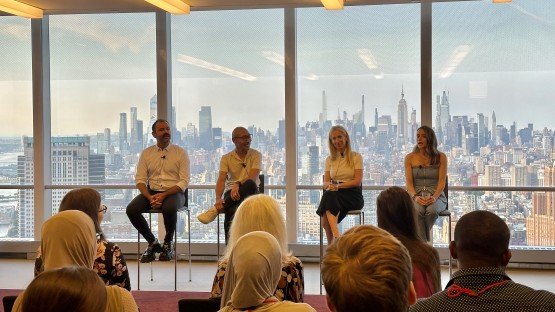Joe Gelber MBA ’18 thinks he has a great idea for a machine that can help people recycle more efficiently, so to get ideas for moving his idea forward, he attended a Cornell Entrepreneur Network event in partnership with the Cornell Alumni Career Program in New York City on June 18. The event was held at the downtown offices of WilmerHale, a global law firm that is the corporate sponsoring partner of Cornell’s Entrepreneurship Program.
“We have renderings of the machine, but we need to test it and see if people will use it,” said Gelber, who has an MBA from Cornell Tech.
Eric Farng MEng ’04 is already beta testing a language-learning product that uses AI to simulate a regular classroom experience.
“Most language apps don’t offer much in the way of listening opportunities or fluency lessons,” he says. “They’re just fancy-looking flashcards.”
Entrepreneurs like Ferng and Gerber were targeted at the “How to Take the Entrepreneurial Leap” event, which featured speakers Lauren Burson (Class of ’04), CEO and co-founder of Conceive; Marissa Saporta (Class of ’99), co-founder of Gorilla Commerce; and Siwat Siensanao (MBA Class of ’15), co-founder of Recoup Beverage, Inc. Executive coach Chris Donohoe (Class of ’09) moderated the discussion.
“This discussion will be useful for anyone working in a corporate world thinking about changing jobs or taking a new leap in their career and wondering whether they can do it, how hard it will be, what the pathways are,” Donohoe said at the start of the discussion.
Burson said attending an event similar to this one at the Cornell Club inspired him to get into the technology industry and start his own company a few years later.
“I had felt stuck in my career, so I listened to a few founders, including Gwen Whiting (Class of 1994) of The Laundress,” she said of that night. “I remember feeling inspired and excited. I quit my job, got into the technology world, and started some interesting projects in the digital health space.”
Then, after seven years of her own infertility treatment, she saw an opportunity to create Conceive. “I saw this opportunity and a problem that only I could solve. I couldn’t stop thinking about this thing I had to create.”
Panelists spoke about the importance of networking, leveraging connections and experiences at Cornell, and developing the ability to deal with failure.
“My philosophy is that learning from your mistakes is the most important thing,” Siensanao says. “A growth mindset and persistence really help too.”
We also discussed how to determine if an idea is something you really want to move forward with.
“When I work on a new business idea, I don’t want to reinvent the wheel,” Saporta says. “I look at businesses that already exist, have strong market demand, and that I can learn from and talk to consumers about. I want to understand what’s working, what’s not, and make sure there’s an opportunity for profit. To me, it would be really lame to make what I think is the hottest gadget and no one wants it.”
Gelber said he came away from the event with some ideas for connecting with consumers who can test their products, while Ferng said he came away with some ideas for developing a minimum viable product. “We heard a lot of advice on all levels of encountering problems,” Ferng said. “It’s been really helpful to hear the advice so far, and we’ll continue to seek more advice in the future.”
Cornell alumni can take advantage of the Cornell network and join the Cornell Entrepreneur Network and Cornell Alumni Careers Program to learn about upcoming events and resources.

